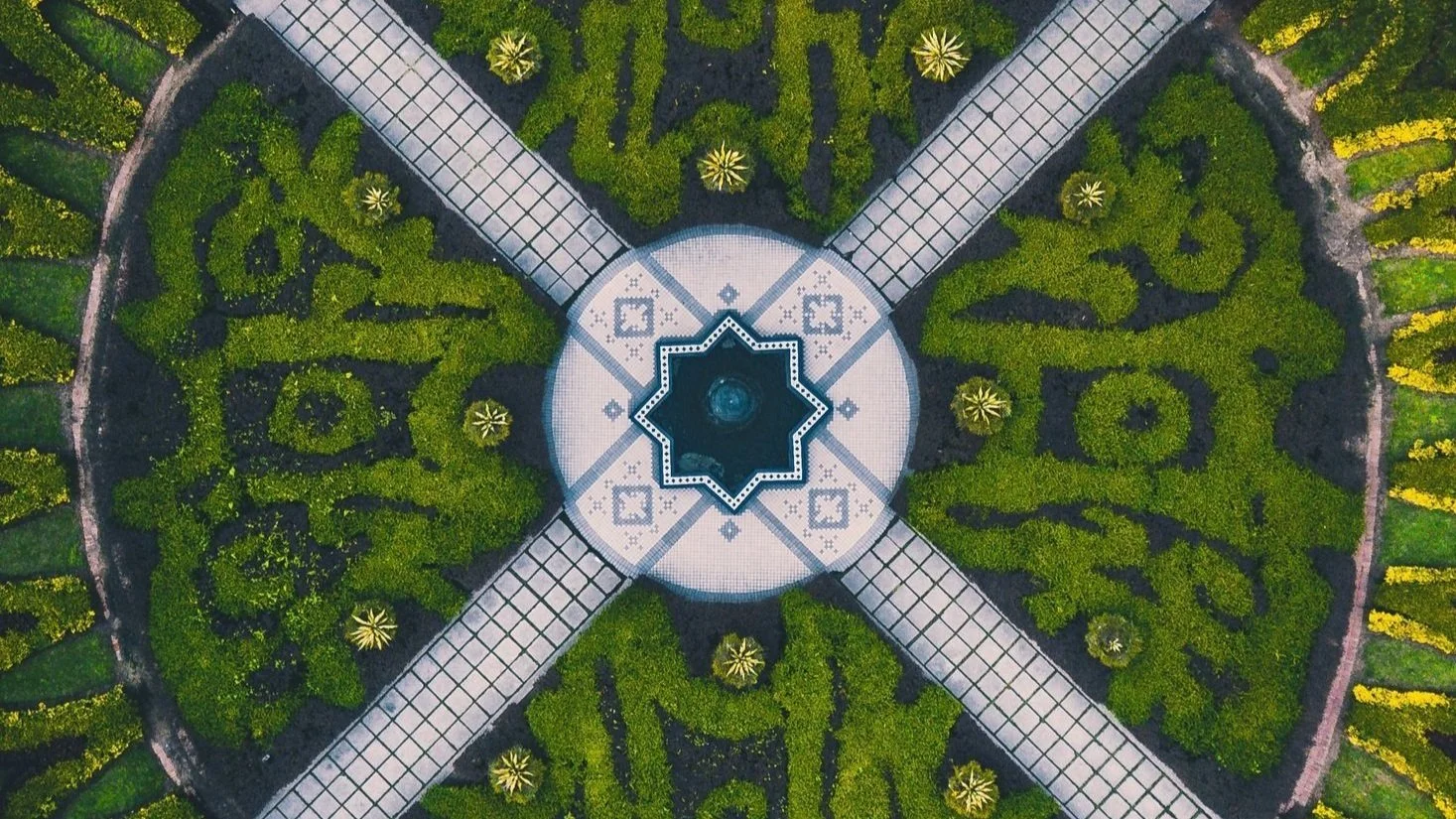God’s Garden: Reflections from Encounter
Towards the end of my 3rd year training on Encounter, we were invited to visualise a garden. I was tired after a hectic week, not expecting much from the exercise. What emerged came as a surprise - a ‘gift’. Our tutor told us the gardens we had visualised represented each of us as a spiritual director – our unique calling. From a rough sketch, I recreated my garden in colour, and pondered its significance.
My garden, just like spiritual accompaniment, is for all seasons. It offers refreshment and nourishment, with different resting places and ‘rooms’ (“in my Father’s house are many mansions”) recognising the diversity and differing needs of those we accompany. Originally, I imagined a ‘secret garden’ accessed by doors needing keys to unlock them. But my garden ended up open to all who come - from North, South, East and West – representing my desire to accompany people beyond the boundaries of orthodox faith. The garden contains different cultural influences; a Greek temple, Zen garden, Islamic art – just as my own spiritual journey and some of those I accompany, will be informed by traditions beyond Christianity.
The maze represents the labyrinthine struggles of our spiritual journeys, times when we lose our way and encounter dead-ends. There are works of art to contemplate, just as direction engages creativity and imagination. It has both cultivated and wild spaces, just as some parts of our psyches are tamed and ordered, whilst other parts run free. Creatures with fur, feather and fin appear in the garden – honouring our instinctual parts; repressed shadows and playful selves – which, if we are brave enough to bring to direction, have much to teach us. The garden invites all the senses. If we are wise, we take off our shoes to stand on holy ground. Sometimes images pregnant with meaning dance before our eyes; other times we catch the sound of the Spirit beneath the clatter of words. Sometimes we delight in tasting sweet fruits of the Spirit; other times the bitter tang of cleansing herbs. And if we are fortunate, we may detect the fragrance of the Divine which wafts into a session when we least expect it.
The image shows the garden of spiritual direction at its best. Left to my own devices it will soon become overgrown - full of weeds and thistles which choke more tender growth. I must remember it is not my garden, but God’s. I am invited to do my part in maintaining its borders, watering seeds and harvesting fruits, but I am not the head gardener.
As the garden took shape, the centrality of the cross surprised me. It seemed serendipitous. Earlier that day reflecting on a palm cross I’d seen embedded on a wire fence encircling wasteland, I had written in my journal summary:
“The cross is not ‘obviously’ central to me and the church I serve, and not always central to the directees I work with… And yet on the periphery it catches my eye and I’m glad it’s there, keeping vigil. The cross as a symbol of God’s solidarity with our suffering and brokenness adds something necessary to the process of spiritual growth even for those on the margins who don’t easily recognise Christ.”
As a Unitarian minister, I work with some who find the cross to be a symbol of religious oppression, and I have my own theological baggage. During Encounter training I have struggled to find my charism in relation to ‘Christian’ spiritual direction. Yet here was my garden in the undeniable form of a cross!
It is a Celtic cross (with American Indian influence), encompassed by a circle (the earth) with equidistant arms uniting heaven and earth, spirit and matter. Not held aloft as a symbol of Christendom, but trodden underfoot, representing God’s long-suffering love for all creation. Walking in this garden, the cross is not immediately obvious. Embedded in the ground, out of plain sight, it represents for me, the universality of Christ as the Way - the path we walk upon, whether conscious of it or not. Perhaps not surprisingly, given the influence of Carl Jung on my journey, the garden has ended up as a four-fold ‘mandala’. Jung saw the cross and Christ as a symbol of wholeness – the totality of the Self. And at the centre of the garden is a pool – the living water which Jesus in the Gospels (and Lady Wisdom in Hebrew scripture) invites all who are thirsty to drink from.
Having now completed my training as a spiritual director (a transforming experience) it feels a great privilege to be able to invite people into the garden of direction. No doubt further secrets from God’s garden will disclose themselves in the coming years.
Questions for you and your directees:
Reflect on your own "spiritual garden." What does it represent, and how has it evolved over time? How does it relate to your role as a spiritual director?
Explore the concept of the garden as a metaphor for spiritual accompaniment. What aspects of a garden resonate with your approach to guiding others on their spiritual journeys?
Reflect on the inclusivity of your garden. How do you ensure that it's open to people from diverse backgrounds and belief systems? What practices do you employ to honor cultural influences and traditions beyond Christianity?
Explore your thoughts on the cross as a symbol, especially if you work with individuals who have varying perspectives on it. How do you navigate differences in belief while still incorporating its symbolism in your work?
Rev. Sheena Gabriel
Raised in the Pentecostal church, Sheena is now a minister within the Unitarian church. She has received training at the LCSD and has a background in special educational needs, creative therapies, and counseling. Sheena's love for art, poetry, stories, and the natural world enriches her perspective. While rooted in the liberal Christian tradition, she draws inspiration from the wisdom traditions of various faiths and spiritualities. She is comfortable accompanying people across different traditions, including those on the fringes of belief, those who have been wounded by past religious experiences, individuals with health-related issues or disabilities, and LGBTQ+ members of the community.


